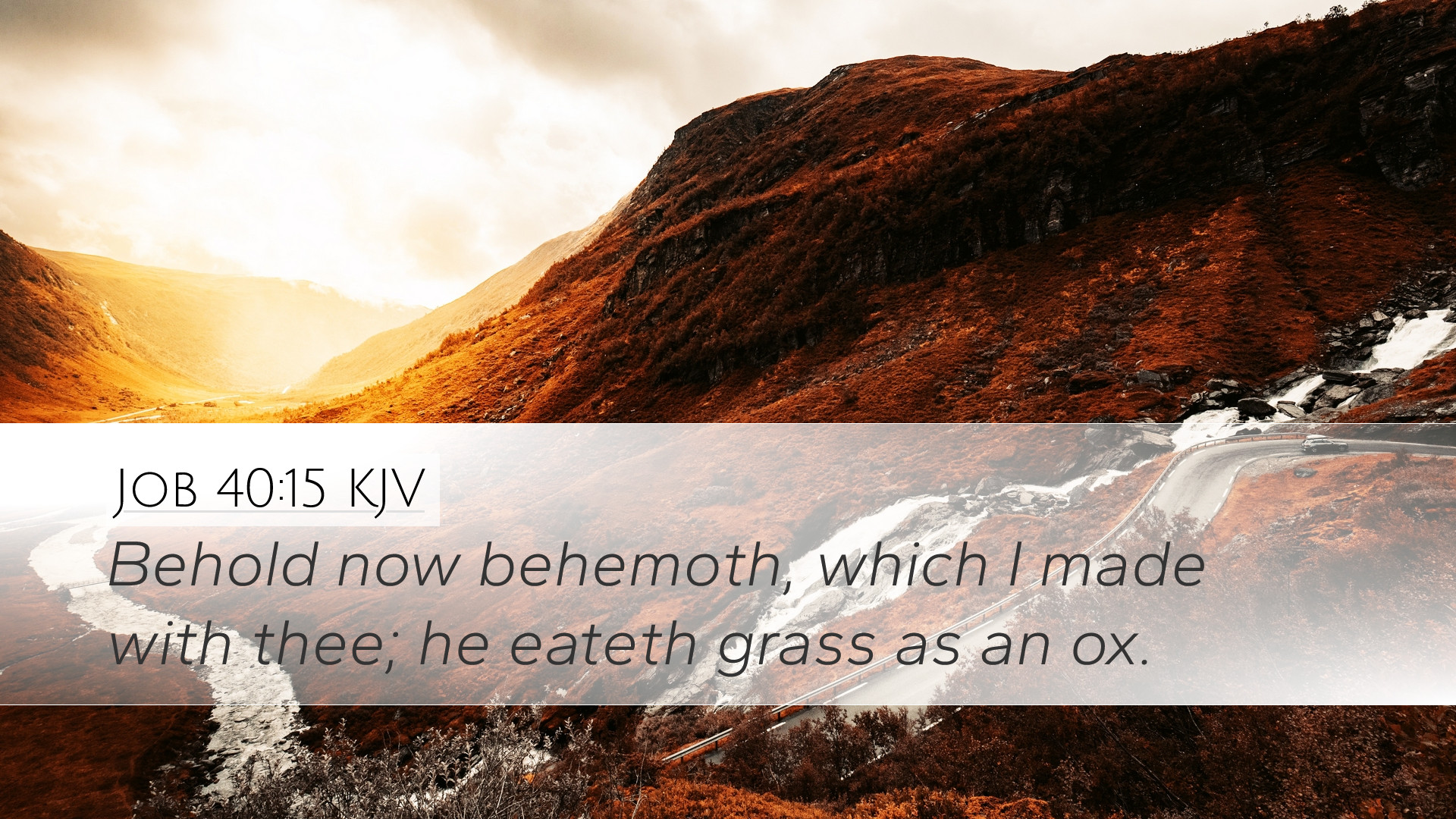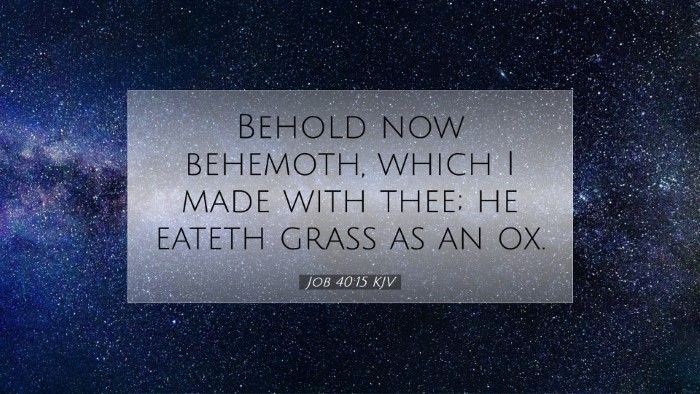Old Testament
Genesis Exodus Leviticus Numbers Deuteronomy Joshua Judges Ruth 1 Samuel 2 Samuel 1 Kings 2 Kings 1 Chronicles 2 Chronicles Ezra Nehemiah Esther Job Psalms Proverbs Ecclesiastes Song of Solomon Isaiah Jeremiah Lamentations Ezekiel Daniel Hosea Joel Amos Obadiah Jonah Micah Nahum Habakkuk Zephaniah Haggai Zechariah MalachiJob 40:15
Job 40:15 KJV
Behold now behemoth, which I made with thee; he eateth grass as an ox.
Job 40:15 Bible Commentary
Commentary on Job 40:15
Introduction
The passage in Job 40:15 states, "Look now at the behemoth, which I made along with you; he eats grass like an ox." This verse is part of a larger discourse where God speaks to Job, presenting various aspects of creation to highlight Job's limited understanding of divine wisdom and power.
Contextual Analysis
This verse is situated in a profound section of the Book of Job, where God answers Job out of the whirlwind. The purpose of this divine discourse is to illustrate the majesty of creation and the authority of God. Job had been questioning God’s justice and sovereignty amidst his suffering, and God's answer prompts Job to reassess his perspective.
The Symbolism of the Behemoth
The term "behemoth" has been variously interpreted. While some scholars suggest this may refer to a large animal, possibly a hippopotamus or an elephant, others regard it as a symbol of chaos or a representation of God's untamed creation. Matthew Henry notes that “the behemoth is a creature of great strength and size, symbolizing the power of God as evident in nature.”
Theological Implications
In addressing Job, God emphasizes that even in the seemingly mundane act of a creature eating grass, there is a divine orchestration.
- God’s Sovereignty: The statement “I made along with you” signifies God's control in creation. Job, as part of creation, is reminded of his position relative to the Creator.
- Purpose in Creation: The behemoth serves a purpose in the ecosystem, demonstrating that all elements of creation, including the seemingly disordered or fearsome, have their role under God's guidance.
Commentary Insights
Matthew Henry's Perspective
According to Matthew Henry, the behemoth is a majestic creature that demonstrates God’s power and creative prowess. Henry suggests that God’s reference to the behemoth serves to remind Job of the wonders of the natural world that no human can fully understand or tame. Henry emphasizes that this creature, despite its size and strength, is still part of God’s orderly creation, which should inspire awe rather than fear.
Albert Barnes’ Interpretation
Albert Barnes approaches the text by indicating that the behemoth is an illustration of God’s might. Barnes interprets God’s challenge to Job to look upon this mighty creature as a way of impressing upon him the greatness of God's creative acts. Barnes reminds us that the strength and supposed chaos represented by the behemoth signifies God’s ultimate authority and the reality that God rules even amidst disorder.
Adam Clarke’s Insights
Adam Clarke focuses on the nature of the behemoth’s diet, stating that "he eats grass like an ox" points to a non-predatory existence, which reflects God’s intention for harmony within creation. Clarke delves into the implications of dietary habits in the animal kingdom and highlights that, like Job, we too are nourished by God’s provision, emphasizing reliance on divine sustenance.
Reflections for Pastors, Students, and Theologians
The contemplation of Job 40:15 has significant implications for contemporary readers and scholars:
- A Call to Humility: The passage invites readers to adopt a posture of humility when facing life's challenges. Recognizing God’s omnipotence in creating beings like the behemoth can inspire trust in God's purposes.
- Understanding Creation: This brings to light the interconnectedness of creation. Understanding creatures' roles can lead to deeper ecological awareness among scholars and theologians.
- The Nature of Suffering: The exploration of behemoth alongside Job’s plight raises critical discussions on suffering, divine presence in hardship, and how God's presence permeates through all creation.
Conclusion
In examining Job 40:15, we find rich theological themes of God’s sovereignty, the mysterious nature of creation, and humanity's place within it. The behemoth serves as a reminder of the power of God and the need for reverence and humility in understanding our existence and the created order. The insights from various commentaries enrich our appreciation for this text, providing layers of meaning that can nourish theological reflection and enriching sermons.


